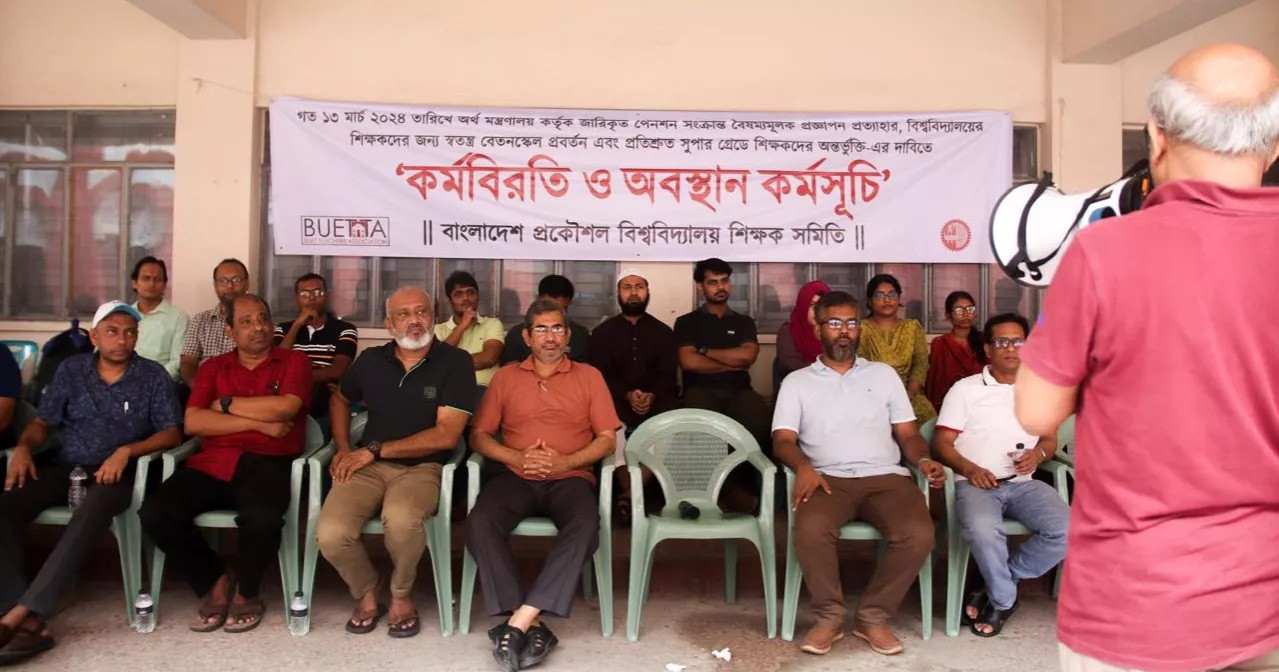Nearly all public universities in the country have been experiencing an all-out strike of teachers since 1 July. People are now widely aware of this news and understand the reasons behind the strike.
Teachers are said to be the conscience of the nation and the architects of the country’s future. Whether it is the Liberation War of Bangladesh or any deep crisis faced the country, teachers and students have always stepped forward. This time, the movement is about protecting teachers’ existence and reclaiming their dignity. Teachers at all levels, from primary to university, have always been deprived in this country.
Even BCS education cadre teachers are less privileged compared to other cadres. Teachers’ demands are not overly ambitious—they do not seek personal cars, power, government money for fuel, or protocol privileges like bureaucrats. They only seek a little respect and a decent living. If this minimal right is not granted, why would the new generation pursue this profession?
Let’s discuss the universal pension scheme. We all have some understanding of it, and when the prime minister launched it last year, she clearly stated that it was not for those who already have pensions. It is for the large population segment without pensions.
However, even after one and a half years since its inauguration, the universal pension scheme has not gained much attention. Suddenly, without consulting anyone, the Ministry of Finance issued a circular saying to include autonomous institutions in a pension scheme named ‘Prottoy’. This, along with long-standing demands for a separate pay scale and super grade for teachers, has led to ongoing protests. The pension authorities repeatedly claimed that this new scheme is much more profitable than the previous one, offering returns 10 to 12 times greater.
However, a member of the pension authorities mentioned on a private TV channel that the government introduced the funded pension system following the developed world to reduce government expenditure, which will indeed increase costs 8 to 10 times compared to the previous scheme. Teachers are actively protesting. They are not asking for much—they want to retain their previous benefits.
After nearly three months of protests, without any scrutiny, the pension authorities’ dismissive press release proved that they made this shortsighted decision without proper calculations, based on advice from some internal government factions. Let's consider another aspect: teachers will retire at the age of 65 years, and given the average life expectancy in Bangladesh, they will benefit from the “Prottoy” scheme for only ten years. If someone dies at 75, no one will receive the pension afterward. Previously, teachers received Tk80 lakh as gratuity.
A teacher can receive Tk1,31,00,000 in cash from the GPF fund and leave encashment, and this amount can generate a monthly return of over Tk1,28,000 at a rate of 11.76% through safe investment. So, a teacher has the opportunity to earn Tk1,68,000 monthly (a monthly pension of Tk35,000 and benefit from investment).
On the other hand, this Prottoy scheme offers only Tk1,24,000. Then, how is the Prottoy scheme 12 to 15 times more profitable for teachers? Moreover, those joining after 2024 will mostly retire around 2060 or later, yet the pension authorities have already determined that they will receive Tk124,000 per month. The question is, with rising inflation, will the value of Tk.124,000 in 2060 be halved?
Under the previous system, teachers received Eid bonuses, Baishakhi allowances, and a 5% annual pension increase. If a teacher died, their spouse would receive a lifelong pension. The Prottoy scheme does not provide these benefits. The pension authorities cite examples from India and other countries.
They surely know the salary structures of teachers in those countries. In India, a teacher’s salary starts at around INR60,000, equivalent to Tk80,000 in Bangladesh, and even in Pakistan, with its fragile economy, a teacher’s salary starts at PKR150,000, while in Bangladesh, a lecturer’s salary is only Tk32,000 to Tk33,000. If they have to contribute Tk5,000 to pension scheme from this salary, can they really live with their family in a divisional city?
Teaching is an honorable profession, and no matter how high you have climbed, after your parents, your teachers have contributed the most to your success—something most people forget. In most countries, teachers are held in high regard. Teachers are accustomed to teaching in classrooms and focusing on research, but if such a decision is forced upon them, no teacher will want to return to the classroom. We are not asking for many benefits or 15 times more profit; we just want our previous pension scheme back.
_____________________________________
The writer is a Lecturer, Department of Public Administration, Begum Rokeya University, Rangpur. Email: [email protected]


